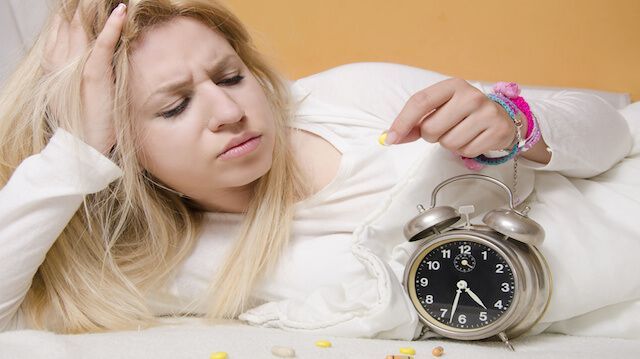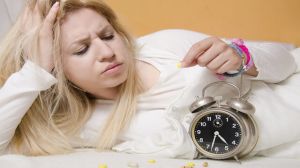
Between work, wrangling a toddler, and maintaining some semblance of order in my home, I’ve often struggled with getting myself to bed on time. However, each time I forsake sleep for something “more important” I feel I need to do, my mind and body suffers! Through the years, I’ve learned how absolutely crucial sleep — at least seven hours a night — is to both my health and my sanity!
After a night (or a couple nights in a row) of five or six hours — which I’ve often tried to convince myself is enough — I find that my skin looks dry and pallid, I get acne, I cannot focus properly, I am irritable, I forget things, and I feel all-around out of it. All of these signs put together tell me I need to start sleeping more! The scary thing is, not getting enough sleep can lead to far worse things.
You see, a full night’s sleep is essential for keeping the brain detoxified. Without this necessary process, things tend to get quite cluttered. This could be why sleep itself may help to prevent a number of neurological disorders. It may also help to prevent many symptoms of anxiety, depression, and other psychological troubles. I know firsthand that when I don’t get enough sleep, my anxiety often worsens dramatically.
If lack of sleep becomes chronic, things can get even more serious.
Some major dangers of sleep deprivation
Earlier this year, the results of the WHO (World Health Organization) MONICA (Multinational MONItoring of trends and determinants in CArdiovascular disease) study on sleep and cardiovascular disease was presented by the European Society of Cardiology at the annual EuroHeartCare meeting in Dubrovnik, Croatia. On the nature of the research, the study’s leader, Professor Valery Gafarov, stated:
“Sleep disorders are very closely related to the presence of cardiovascular diseases. However, until now there has not been a population based cohort study examining the impact of sleep disorders on the development of a heart attack or stroke.”
For their study, Gafarov and his fellow researchers followed 657 men between the ages of 25 and 64 (considered to be a representative sample) for a period of 14 years. During the study, the men rated their sleep quality, and it was noted how many of them experienced a heart attack or stroke.
Results of the study showed that men that were rated as having a sleeping disorder (defined by rating their sleep as “poor” or worse) had up to 2.6 times the risk of a heart attack, and up to 4 times the risk of a stroke, than men who were not rated as having a sleeping disorder during 5 to 14 years of follow-up research. On these results, Gafarov commented:
“Sleep is not a trivial issue. In our study it was associated with double the risk of a heart attack and up to four times the risk of stroke. Poor sleep should be considered a modifiable risk factor for cardiovascular disease along with smoking, lack of exercise and poor diet. Guidelines should add sleep as a risk factor to recommendations for preventing cardiovascular disease.”
This recent study was not the first to connect lack of sleep with elevated stroke risk. A 2012 study, presented by the American Academy of Sleep Medicine at the SLEEP 2012 convention in Boston, Massachussetts, linked sleeping less than six hours per night with notable increases in stroke risk for middle-aged and older adults.
For this study, 5,666 individuals, all of whom had no history of stroke, and no high risk of sleep apnea, were followed for up to three years. The results were adjusted for the participants’ BMI, health behaviors, depression symptoms, and factors for stroke risk. On the results, lead author Megan Ruiter stated:
“In employed middle-aged to older adults, relatively free of major risk factors for stroke such as obesity and sleep-disordered breathing, short sleep duration may exact its own negative influence on stroke development. We speculate that short sleep duration is a precursor to other traditional stroke risk factors, and once these traditional stroke risk factors are present, then perhaps they become stronger risk factors than sleep duration alone.”
The authors of the study, which was later published in the Journal of Stroke and Cerebrovascular Diseases, wrote:
“Among middle-aged to older employed individuals of normal weight and low risk of OSA [obstructive sleep apnea], self-reported short sleep duration is prospectively associated with increased risk of stroke symptoms.”
… Those are a whole lot of risks for something as seemingly trivial as not getting enough sleep! It’s about more than grogginess: Chronic lack of sleep could severely impact — or even end! — your life.
Can’t sleep? There’s hope!
While my struggles with sleep have mostly been centered around scheduling, many people worldwide struggle with insomnia. Symptoms of insomnia can be varied — some people wake up multiple times per night, others have a hard time initially falling asleep, and some people simply do not enter into deep states of sleep easily. Some unfortunate folks experience all of these symptoms on a regular basis.
If you’re struggling with insomnia, there are many things you can do that are completely natural and have been shown to be highly effective for many people. If your insomnia is in a particularly bad state, one thing to try may be cognitive behavioral therapy.
A new study, published in the journal SLEEP, found that just one hour of cognitive behavioral therapy, administered in the early stages of insomnia, can provide significant benefits. For the study, 40 participants, all of whom had been struggling with insomnia for a duration of two weeks to three months, and were not on any medications for their insomnia, documented their sleep patterns for a week before the study.
The researchers leading the study then assigned half of the volunteers to a one-hour cognitive behavioral session. During the session, they were instructed about various sleep strategies, and were given information and sleep diaries to take home. The other half of the volunteers were a control group, and did not receive cognitive behavioral therapy.
On the results of the study, lead researcher Jason Ellis stated:
“The results of our study clearly showed that a single therapy session had successful results, with an improvement in sleep quality for some 60 percent of those with acute insomnia within one month. The longer-term benefits were even better with almost three quarters of those who received the intervention not developing chronic insomnia.”
To summarize, the study authors concluded:
“This single session of cognitive behavioral therapy for insomnia (CBT-I) is sufficiently efficacious for a significant proportion of those with acute insomnia.”
Aside from cognitive behavioral therapy, there are many tips, tricks, and strategies that you can try at home. Check out our article on arranging your bedroom for optimal sleep success, and this one on gearing yourself towards successful sleep. There are also a number of stretches you can do, as well as many nifty nighttime beverages you may try!
 For me personally, I’ve found that a few minutes of meditation right before bed helps to quiet and center my mind a lot. Also, as far as herbs, a cup of chamomile tea (for a mild sedative effect), or a few drops of a high-quality kava kava root extract (a bit stronger), can be highly effective. Make sure you talk to a health professional you trust before using a supplement though, just to make sure it’s safe and a good fit for your individual health.
For me personally, I’ve found that a few minutes of meditation right before bed helps to quiet and center my mind a lot. Also, as far as herbs, a cup of chamomile tea (for a mild sedative effect), or a few drops of a high-quality kava kava root extract (a bit stronger), can be highly effective. Make sure you talk to a health professional you trust before using a supplement though, just to make sure it’s safe and a good fit for your individual health.
Although there are many sleeping pills on the market, I would highly recommend trying natural options, as drugs can have a number of unwanted side effects, and in large doses, these medications can be fatal. Sleep is highly important, so it makes sense that some people gravitate towards these drugs, but if you seek a solution in nature, you are more than likely to find the one that works for you.
If you’re struggling to find something that works, a trip to a sleep specialist may help you identify the root issue behind your insomnia. Oftentimes, it may be stress. If so, seeking out a counselor that you trust and getting to the bottom of your personal stressors might help a lot.
Tonight, try going to bed an hour earlier, making sure your bedroom is dark and quiet, meditating for a few moments if you wish, and just relishing in the healing power of sleep!
— Tanya Rakhmilevich
Tanya is a writer at The Alternative Daily with a passion for meditation, music, poetry, martial arts, and overall creative and active living. She has a special interest in exploring traditional Eastern remedies and superfoods from around the globe. Currently, she and her son live in Wisconsin, where they enjoy spending time immersed in nature.
Sources:
https://www.northumbria.ac.uk/about-us/news-events/news/2015/06/73-of-insomniacs-cured-after-1-hour-therapy-session
http://www.escardio.org/The-ESC/Press-Office/Press-releases/Last-5-years/Poor-sleep-associated-with-increased-risk-of-heart-attack-and-stroke
http://www.journalsleep.org/ViewAbstract.aspx?pid=30045
http://www.aasmnet.org/articles.aspx?id=3120
http://www.ncbi.nlm.nih.gov/pubmed/24119626

